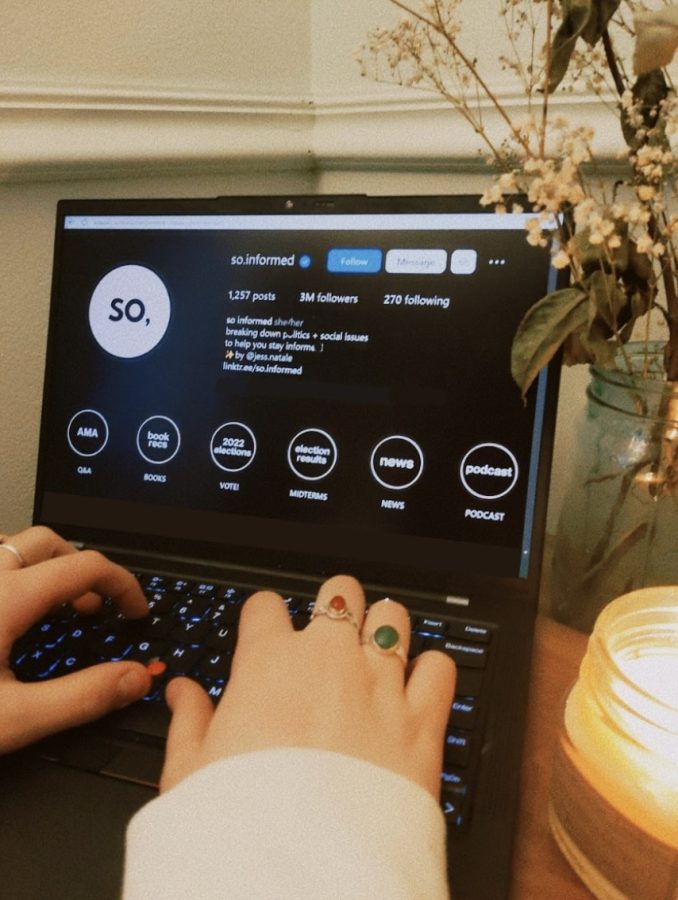Is Social Media Activism’s End?
Social media activism may be gaining popularity, but not all that glitters is gold. In a world where support for social issues is losing sincerity, users should be cautious about how they are participating in social media activism.
It is 2020. Your phone is filled with breaking news flashes, whipped coffee recipes and… activism. Except it does not really look like activism at all; it is neatly bundled slideshows with bubbly graphics and reposts asking you to sign a petition. And yet, these unassuming vessels of reform are tearing the internet in half.
One day, Instagram is overflowing with black squares and the next day, Twitter creators are arguing over the highly controversial presidential election. Tensions are already high, and it seems impossible to escape this sudden influx of social cognizance. Just as soon as one issue takes its course through the uncredentialed critics of the internet, another issue takes the hot seat for only a hot second. The “activism” seems endless but the net change, ultimately, looks close to zero. What is going on?
In an increasingly connected world where nearly everyone has access to the internet and popular social media sites, virtually everyone has the ability to continue a train of efforts ignited by well-meaning activists around the world. But as the train gets longer and longer, the impact and genuinity of the activism dwindles to a thread.
2020 proved to be one of the most tumultuous years in our modern history, beginning with the pandemic and descending into chaos surrounding the George Floyd protests.
It is not uncommon to see people, from celebrities to your close friends, reposting activism content on a nearly daily basis; the overwhelming doomsday news, as well as societal pressure, push many people to partake in activism. But how much is a simple repost accomplishing? And how much does it show that you care?
If you are familiar with the popular social media site Instagram, you have probably seen snazzy activism content that seeks to inform consumers about a contentious issue. It is easy to skim through the information on each page and share the post with your followers. But no ten-slide Instagram carousel can completely cover the nuances of every issue, and basing your knowledge on solely that can result in misinformation. Trigger-finger posters often rush to repost eye-catching titles without realizing that information is inaccurate or unreliable.
At its core, performative activism is not about contributing to a cause; rather, it’s about proving one’s altruism to their social circle. Leina Gabra, author of the article “Your Instagram Story is Not Enough,” poses the question, “But — what about what is not shared on social media? Even among the stories that were, how many do we remember after the initial frenzy? And, more importantly, after social media forgets, what are you doing to fight for what you believe in?”
For most people, the commitment to the cause does not extend past the quick repost. When the desire to look like a good person is paired with inaction, it causes a movement to lose its credibility… and its heart.
The issue is also rooted in how social media users consider aesthetically-pleasing diagrams as a comprehensive view into the topic at hand. Ijeoma Oluo, a prominent activist and author, explains that the popular infographics are oversimplifying complex issues, and that consumers are relying on those infographics as their only source of information on the topic instead of using it as a springboard for further research.
The lack of information that can result from simplified PowerPoints has even more repercussions: it can harm a real movement behind an issue. When #blackouttuesday flooded the internet with black squares, those who accidentally used the hashtag #blacklivesmatter filled the respective tag page with the black squares, pushing educational videos and content from Black activists to the side.
And, like so many other similar instances, the trend of this widespread activism soon shifted its attention to other issues, like Free Palestine, leaving the landscape of Black activism barren. Why should the attention given to certain issues depend on the flimsy, trend-obsessed culture of our social media?
Without putting in the time to actually learn about an issue, reposting clickbait titles and misguided posts can circulate through the internet at rapid speeds. And when we are more attracted to flashy headlines than we are to meaningful discussions by those facing the issue firsthand, authentic and intentional dissemination of the topic is often swept under the rug for another short-lived interest; the integrity of the issue is stripped away permanently. In a place where our collective attention span is less than a day, serious activism has no place.
The views and opinions expressed in this article are those of the author(s) and do not necessarily reflect the official policy or position of The Cardinal Chronicle. Any content provided by our journalists is of their opinion and is not intended to malign any religion, ethnic group, club, organization, company, individual or anyone or anything.









